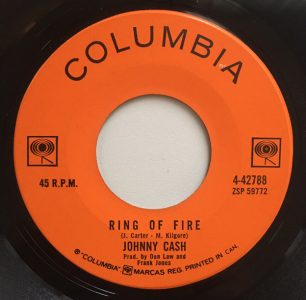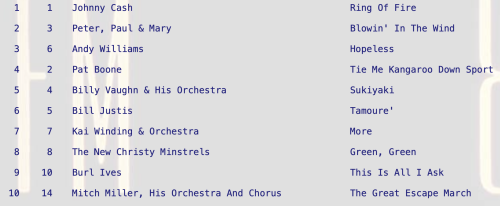#11: Ring Of Fire by Johnny Cash
City: Montreal, PQ
Radio Station: CJAD
Peak Month: July 1963
Peak Position in Montreal ~ #1
Peak position in Vancouver ~ #27
Peak Position on Billboard Hot 100 ~ #17
Peak Position on West German Singles chart ~ #27
YouTube: “Ring Of Fire”
Lyrics: “Ring Of Fire”
John R. “Johnny” Cash was born in Kingsland, Arkansas, in 1932. At the age of five he started working with his sharecropping parents and siblings in the cotton fields. During his childhood his family home was flooded twice. He began singing and playing guitar by the age of 12. He moved to Detroit in his late teens for work. He was drafted and served in the U.S. Air Force as a Morse Code Intercept Operator for Soviet Army transmissions at a base in Germany from 1950 to 1954. When he was discharged from the military he and his new wife, Liberto, moved to Memphis. Cash worked as an appliance salesman while trying to get a break in the music industry. Cash got to audition with Sun Records in 1954. He had his first charting single on the Billboard Country charts in 1955 titled “Cry! Cry! Cry!” Subsequently single releases, “So Doggone Lonesome” and “I Walk The Line” climbed to #4 and #1 on the Country charts. The latter hit also was his first debut on the Billboard pop charts where it made it to #17 in 1956.
By the end of the 1950’s Johnny Cash was a household name. Cash appeared on The Ed Sullivan Show, The Tonight Show Starring Johnny Carson and other variety shows. He managed to chart five singles to the #1 spot on the Billboard Country charts. Besides “I Walk The Line”, two of these, “Guess Things Happen That Way” and “Ballad of a Teenage Queen” were his most notable pop crossovers.
Though he returned often to the Top Ten on the Billboard Country chart in the late 50’s with “All Over Again”, “Luther Played The Boogie”, “Don’t Take Your Guns To Town” and others, Johnny Cash struggled to do much better than crack the Top 40 on the pop charts. The latter was a number-one hit for the singer on the Hot C&W Sides chart from February 23 to April 6, 1959. “Don’t Take Your Guns To Town” was a #3 hit in Australia. Another Top Ten country hit for Johnny Cash in 1959 was “I Got Stripes”.
By the time Cash released “The Rebel – Johnny Yuma” in 1961, he had sixteen Top Ten country hits in the USA, and three hits in the Top 20 on the Billboard Hot 100. In Vancouver (BC), “The Rebel – Johnny Yuma” was the third Top Ten hit for Johnny Cash from September 1956 into the early 60’s.
“The Rebel – Johnny Yuma” was part of the wild west motif, iconic for American males to emulate. Cash had appeared in an episode of Shotgun Slade in 1959 and Wagon Train the same year. In 1961 he appeared in The Deputy, a TV show about a deputy who is also storekeeper who only used his gun reluctantly to confront criminals. His follow single to “The Rebel – Johnny Yuma” was “Tall Men“.
In 1961, Johnny Cash also starred in a crime film titled Five Minutes to Live. He later starred in a western in 1971 called A Gunfight. During the cultivation of his outlaw image, Johnny Cash was on a downward spiral starting in 1958 where for nine years he abused drugs and alcohol. His addiction to drugs and alcohol was owed, in part, to a schedule of up to 300 concerts a year for many years.
In 1963, Cash released “Ring Of Fire”. The singer had failed to crack the Top 40 on the Billboard Hot 100 the past 22 single releases. But “Ring Of Fire” caught on.

“Ring Of Fire” was cowritten by June Carter and Merle Kilgore. Valerie June Carter was born in 1929 in Maces Springs (VA) in an area known as Poor Valley because of the poor soil. She was born into a musical family and by the age of ten in 1939 she was in the line-up of The Carter Family. From 1943, she was part of a recording act known as The Carter Sisters and Mother Maybelle. After marrying Johnny Cash in 1963, June and Johnny went on to record notable country hits. These include “It Ain’t Me Babe” (1964), “Jackson” – which earned them a Grammy Award for Best Country & Western Performance Duet, Trio or Group – and “Long-Legged Guitar Pickin’ Man” (1967), “If I Were A Carpenter” (1969) – which earned them a second Grammy Award in the Best Country Performance by a Duo or Group with Vocal category, and “No Need To Worry” (1971). June Carter Cash became a regular on The Johnny Cash Show from 1969 to 1971. In 2000, she won a Grammy Award for Best Traditional Folk Album for Press On (1999). In 2004 she again won a Grammy Award, posthumously, for Wildwood flower. The album was released in September 2003, six months after she died in March 2003 at the age of 73. In 2004, she also posthumously won another Grammy Award for “Keep On The Sunny Side” in the Best Female Country Vocal Performance category.
Merle Kilgore was born in Chickasaw (OK) in 1934, and raised in Shreveport (LA). He began learning the guitar as a boy. While delivering newspapers to the local radio station at the age of 14, he noticed Hank Williams arriving to perform on the breakfast show. Merle asked if he could carry his hero’s guitar into the studio, and he loved to recall Hank’s reply, “Grab it, hoss.” At 16 he got a job as a DJ at the station, and became lead guitarist on the popular Saturday night country music jamboree, Louisiana Hayride. He began to play across the south and his songwriting abilities were proved when Webb Pierce topped the US country charts in 1954 with Kilgore’s number, More And More. He recalled his success with relish: “They sent me a royalty check for $30,000, and I blew it all. The first thing I did was buy two Cadillacs. The government got the cars back for taxes. I didn’t even know about taxes.”
In 1959, Merle Kilgore wrote “Johnny Reb” which became a Top Ten hit on the country charts for Johnny Horton. In 1960, Kilgore has two Top Ten country hits: “Dear Mama” and “Love Has Made You Beautiful”. In the early 1960s, he toured with Cash as part of his package show. In early 1962, he wrote “Wolverton Mountain” which became a number-one country hit for Claude King, which was a crossover pop hit reaching #3 on the Billboard Hot 100. In 1963, Tommy Roe recorded Merle Kilgore’s “The Folk Singer” which was minor pop hit. Kilgore stood as Johnny Cash’s best man at his wedding to June Carter. In 1964, Merle Kilgore was hired to be the opening performer for Hank Williams Jr. He did this job for 21 years, and his close friendship with Williams led him eventually to manage the performer. He died at the age of 70 in 2005.
Carter got the song’s title and concept from a letter a friend sent her after going through a divorce. It read something like, “Love is like a burning ring of fire. I can’t stand it anymore and I’ll never fall in love again.” Johnny Cash wasn’t the first to record “Ring Of Fire.” That honor went to Anita Carter (June’s sister), who released the original version in 1962. Anita, who sang with June in The Carter Family, had recently signed with Mercury Records as a solo artist. “Ring Of Fire” was one of the songs June and Merle Kilgore wrote for her debut album on Mercury, Folk Songs Old And New.
“Ring Of Fire” climbed to #1 in Montreal, #3 in Port Arthur (TX), and Waco (TX), #4 in Milwaukee (WI), Oklahoma City, Cincinnati (OH), and Evansville (IN), #5 in Rockville (MD), and Akron (OH), #6 in Calgary, #7 in St. Louis, Denver, Hagerstown (MD), and Columbus (OH), #8 in Toronto, and Hamilton (ON), #9 in Kingston (ON) and Topeka (KS), and #10 in San Antonio (TX), Lewistown (PA), and Chicago.
“Understand Your Man”, “The Matador”, “Orange Blossom Special”, “The Ballad of Ira Hayes” and “The One On The Right Is On The Left” among his biggest sellers on the country charts in the mid-sixties. Nonetheless, the hectic pace was very stressful. Johnny Cash was arrested in 1965 for trying to smuggle amphetamines over the Mexican border in his guitar case. He was given a suspended sentence and fined. Cash’s struggles with drugs and alcohol led to divorce in 1966.
By 1968 Johnny Cash was pulling his life back together and recorded a live album in a jail called At Folsom Prison. A live version of “Folsom Prison Blues” reached number-one on the Hot Country Singles chart in ’68. The followup single release, “Daddy Sang Bass”, also topped the U.S. country charts. in 1969, Johnny Cash had a #2 hit on the Billboard Hot 100 titled “A Boy Named Sue”. The single went to number-one on the Billboard Country chart, and Top Ten on the pop charts in Canada, Australia and the United Kingdom. “A Boy Named Sue” received the Country Music Song of the Year award from the Country Music Association. As well, he received the Best Country Male Vocal for the song in 1970 at the Grammy Awards. Cash also won a Grammy Award that year for Best Album Notes for his text for Bob Dylan’s Nashville Skyline.
In the fall of 1969 he hosted The Johnny Cash Show on ABC TV for two years. He used the show to explore controversial issues like the plight of the American Indian, prison reform and the conflict in Vietnam. During the Sixties, Johnny Cash racked up another sixteen Top Ten hits on the Billboard Country charts. In the Seventies, Cash charted another ten singles into the Top Ten on the Billboard Country charts, including three more number-one hits: “Sunday Mornin’ Comin’ Down”, “Flesh And Blood” and “One Piece At A Time”.
In 1982 Cash recorded an album with Carl Perkins and Jerry Lee Lewis called The Survivors Live. Each had been part of the Million Dollar Quartet at Sun Records with Elvis Presley on December 4, 1956. In 1986 Cash was joined by Perkins, Lewis and Roy Orbison to recored an album titled Class of ’55.
Between 1954 and 2003 Johnny Cash recorded 96 albums and 153 singles. Of these 89 singles made the Top 30 on the Billboard Country singles chart. He had 14 number-one singles on the country (variously Hot C&W Sides until 1962 and then Hot Country Singles) charts. Cash kept on performing and recording into the last months of his life. He died at the age 0f 73 of diabetes, four months after June Carter Cash died.
In 2005, Joaquin Phoenix played the starring role of Johnny Cash in the biopic of the artists tumultuous life. In Walk The Line, Reese Witherspoon played the role of June Carter Cash.
July 9, 2025
Ray McGinnis
References:
Johnny Cash – Biography, Johnny Cash.com
Johnny Cash – Biography, Rolling Stone.com
Five Minutes To Live ~ trailer, Sutton Pictures, 1961.
The Death of Gray episode, The Rebel, 1959.
James Mangold, Director, Walk The Line ~ Trailer, 20th Century Fox, 2005.
Garth Cartwright, “Merle Kilgore: Country Music Champion who wrote Ring Of Fire,” Guardian, February 9, 2005.
Geoff Boucher, “June Carter Cash, 73; Lifelong Star of Country Music,” Los Angeles Times, May 16, 2003.
Anita Carter, “Ring Of Fire“, Mercury Records, 1962.

CJAD 800-AM Montreal Top Ten | August 3, 1963

Leave a Reply